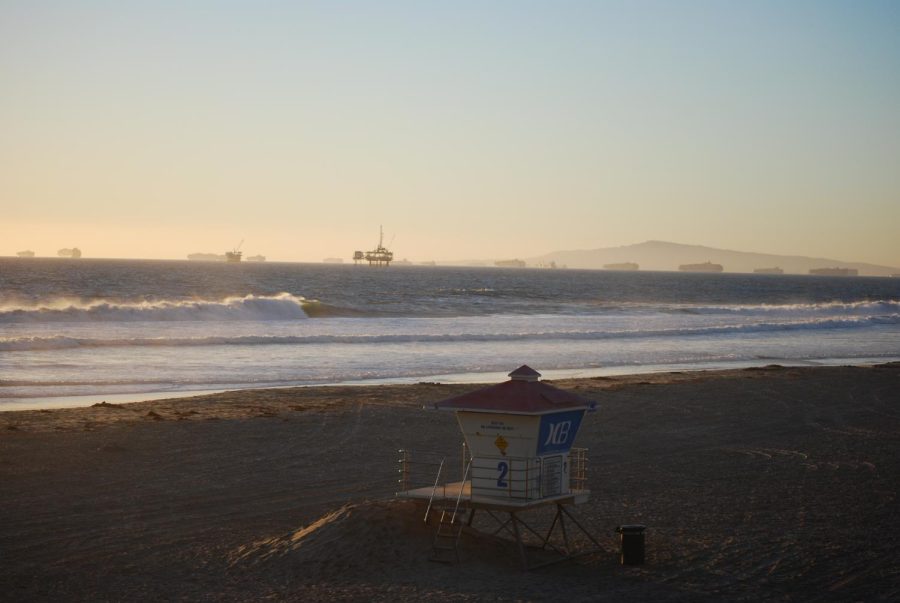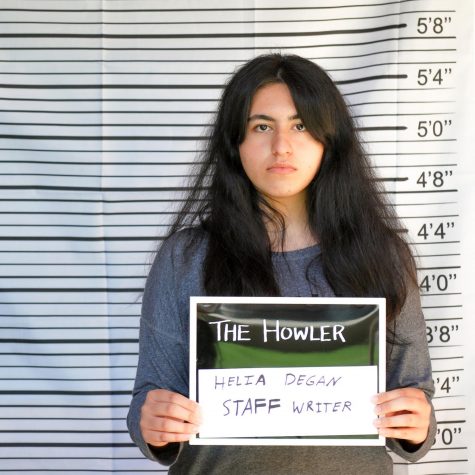Modifying oil drilling regulations
OCEAN CONTAMINATION: Poor safety regulations surrounding oil pipelines led to the Huntington Beach spill.
October 27, 2021
As a result of a recent offshore pipeline leak, roughly 25,000 barrels of oil spoiled the waters off the coast of Huntington Beach. Immediately, chemical constituents of the oil spill devastated the local environment, with dead or injured marine creatures washed ashore onto sandy beaches polluted with tarballs. The disastrous consequences of this oil spill exposes underlying problems in the oil industry—slow responses to reports of oil spills and continued underregulation of oil pipelines and drilling—and emphasizes the need for legislation banning offshore oil drilling.
An oil spill response plan approved in 2016 requires the company at fault to immediately alert federal authorities when oil spills from its pipeline leaks are discovered. Although witnesses reported spotting an oily sheen on the water around 8 p.m. of Oct. 2, an official report to the Coast Guard’s response center was not made until 12 hours later. Quicker reporting would have allowed for investigation to begin sooner, containing more of the spill and minimizing ecological catastrophe.
“By the time it comes to the beach, it’s done tremendous damage,” Orange County Coastkeeper President Garry Brown said. “Our frustration is, it could have been averted if there was a quick response.”
The crack in the pipeline is hypothesized to be a result of damage caused by a ship’s anchor. Regardless, the fault lies mostly with the poor state of U.S. pipelines, which have been in operation for half a century. The majority of these pipelines are vulnerable to deterioration by corrosion and extreme weather, raising concerns about oil infrastructure and the integrity of oil drilling.
There is little inspection during the process of building the pipelines once initial safety standards have been approved. Additionally, due to the cost of removing inactive pipelines, companies often resort to dismantling and leaving them on the ocean floor to decay. Decommissioned pipelines are not monitored by any safety standards, thus more regulation by the Bureau of Safety and Environmental Enforcement is needed to prevent environmental risks posed by abandoned pipelines and ensure pipeline integrity.
Additional preventative measures that could be implemented to ensure that spills do not occur in the future include improved oil drilling strategies. While oil drillers attempt to reduce quantities of methane gas released into the atmosphere, their methods are often still ineffective.
“The use of horizontal and directional drilling makes it possible for a single well to produce oil from a much larger area, which reduces the number of wells necessary to develop an oil resource,” the U.S. Energy Information Administration said.
Clearly, the less oil drilling that occurs offshore, the lower the risk for another spill and its resulting environment disturbances. These regulations on drilling techniques could easily be regulated by the government through new legislation in order to ensure that all companies are following optimal drilling methods and reducing the amount of potential harm created on fragile ocean ecosystems.
Steps that Northwood students can take include starting campaigns to stop oil drilling, participating in local events and voting for officials that will hold oil companies accountable. Ultimately, the government has the greatest ability to change the oil industry through stricter government regulation, and we must support them to create the change needed to prevent future oil spill tragedies.



![AAAAAND ANOTHER THING: [CENSORED] [REDACTED] [BABY SCREAMING] [SIRENS] [SILENCE].](https://thehowleronline.org/wp-content/uploads/2025/06/lucy-1200x800.jpg)



















































![AAAAAND ANOTHER THING: [CENSORED] [REDACTED] [BABY SCREAMING] [SIRENS] [SILENCE].](https://thehowleronline.org/wp-content/uploads/2025/06/lucy-300x200.jpg)



